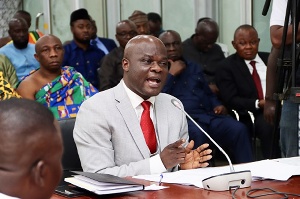- General News
- Crime & Punishment
- Politics
- Regional
- Editorial
- Health
- Ghanaians Abroad
- Tabloid
- Africa News
- Religion
Politics of Tuesday, 3 June 2025
Source: www.ghanawebbers.com
Election of MMDCEs back on the table
Ahmed Ibrahim, Minister for Local Government
Parliament has revisited the need to elect Metropolitan, Municipal, and District Chief Executives (MMDCEs).
Members of Parliament have consistently supported this move. In 2019, the previous Akufo-Addo administration attempted to implement it. However, a last-minute misunderstanding halted progress on the issue. MMDCEs could have been elected by now instead of being appointed.
On May 29, 2025, both sides in Parliament called for a workable framework. They believe an elective system would improve local governance. This discussion followed a statement from MP Eric Nana Agyemang. He argued that “this issue is long overdue.”
The minority members noted that the current government has enough support to implement this idea. The ruling National Democratic Congress promised to do so in its 2020 and 2024 manifesto. Minority Chief Whip Frank Annoh-Dompreh viewed the proposal as necessary reform. He stated that the old system often creates unnecessary tension.
Deputy Majority Chief Whip Richard Acheampong raised concerns about opposition-elected DCEs. He worried they might hinder the government's development agenda. Despite these concerns, there was hope for consensus on national development.
Amendment
First Deputy Speaker Bernard Ahiafor said previous amendments were insufficient. Only Article 243 (1) was amended; Article 243 (3) also needs changes. This amendment would remove the president's power to appoint DCEs.
Ahiafor explained that amending only Article 243 (1) could create challenges. Currently, MMDCs are nominated by the president and confirmed by assembly members with a two-thirds majority vote. Afterward, the president appoints them and can revoke their appointments.
He referred members to Article 249 for clarity on revocation procedures. His argument was simple: if DCEs are elected, the president should not remove them from office.
He concluded that unless Article 243 of the Constitution is fully amended, we may not solve this problem effectively. “Honourable Members,” he added, “we agree that they need to be elected.”











